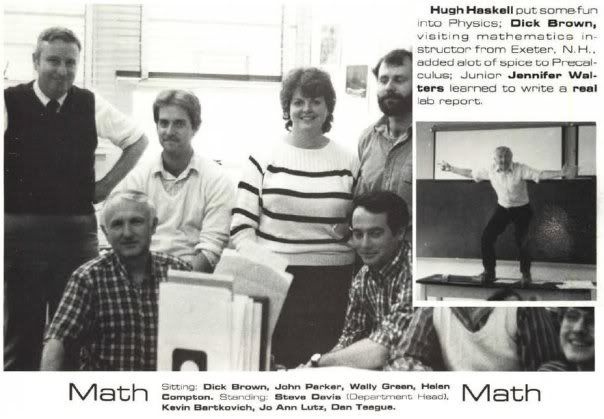|
|
|||
|
|
|

|
|
|
|
|||
|
|
|
|
|
 | ||||
| After my mother died in February 2008, my family and I underwent the task of sorting her belongings to determine what to keep, what to distribute, what to donate, and what to discard. Among the hidden treasures we uncovered during this excavation exercise was a large ZiplocŪ bag of items related to my childhood. These included two years of grade reports from the North Carolina School of Science and Mathematics (NCSSM) during my stay there 1982-84 in grades 11 and 12. Among the various instructors I had there, perhaps none etched in my memory quite so indelibly as visiting mathematics instructor Richard "Dick" Brown. Mr. Brown came to NCSSM from Phillips Exeter Academy in New Hampshire on an year-long exchange program 1983-84, trading places with NCSSM instructor Dot Doyle so that both could benefit from the cross-cultural experience. Poor Mr. Brown! Little did he know that NCSSM offered time challenges he had never experienced in his career. As I reviewed the grade reports for my years at that school, Mr. Brown's comments brought back the most powerful memories. I took his Advanced Placement (AP) Calculus BC course in grade 12. That is a brutal course in any setting, compressing three semesters of college-level calculus into two semesters. Making it more brutal was the fact that the NCSSM schedule limited class meetings for the course to three days per week. (Readers untrained in the ways of university calculus should know that colleges typically take four to five days per week to teach the subject.) My own poor academic planning did not help matters for me. If I had fully understood how to maximize the value of NCSSM, I would have created an integrated schedule of both NCSSM courses and later college courses to "optimize the enterprise." (See my YouTube video "Slash $24,000 and Two Years from College at NCSSM" and my Facebook Note "Project Management Lessons from 'The Invasion of NCSSM'" for more on this.) As it stood, I faced a daunting schedule of Biology, AP Calculus BC, AP Chemistry, AP Physics C, English, Mechanical Drawing, assorted electives, a self-inflicted "Special Projects Year" project, housekeeping, work service, mandatory meetings, and other activities. The NCSSM administration required these ostensibly to "expand our horizons" but, I contend, conspired to keep intellectually hyperactive adolescents "busy and out of trouble"! Regardless of authoritarian motives good or ill, I resolved to do my best in the course. Sadly, my best was only mediocre, earning me a "C" in calculus by year's end though I still earned a "3" on the AP Calculus BC examination and four hours of college credit. I had good company in Mr. Brown's class, though. We all struggled to varying degrees, often wrongheadedly placing the blame on the head of "that bastard Dick" when grumbling in the hallways of classroom buildings and dormitories. In retrospect, it was not really his fault. I have seen how other high schools teach this course and they all granted much more time per week to allow teachers and students to interact and learn. Why the administration at the time thought any teacher could squeeze this much material into those few hours still eludes me. Nevertheless, he did his best to excite and motivate us. One of Mr. Brown's favorite hallmark behaviors involved hopping onto a table at the front of the room, extending his arms, and pleading with us to understand. (See photographic inset of this article.) Another involved tossing chalk gently at the head of any sleeping student, a common occurrence among the sleep-deprived population of NCSSM. Sound effects also peppered his lectures as he drew swooping curves across the chalkboard in preparation for showing us how to integrate the areas under them. "The integral of one over cabin dee cabin equals log cabin plus sea which gives you a houseboat!" he declared in a mnemonic way. When he saw one of us struggling, he would pull us aside individually and ask us how we thought we were doing. "Luke, how did you think you did on the last test?" he would ask in a caring though perhaps intrusive way. More than once, I would receive back a test with a poor grade and a handwritten note that said, "Please see me." The man was intense. He had great passion about his work even if it did sometimes rub some of us the wrong way. "Hey! We are NCSSM seniors! We already know everything! Right?" I will never forget when he pulled aside another classmate and me and actually advised us against taking the AP examination because of our poor performance in the class, barking, "Calculus is not a spectator sport!" Fortunately, we paid him no attention, took it anyway, and placed into the same Calculus II course in college. One feature of NCSSM grade reports that distinguishes it from a normal high school involves the much closer teacher attention given to each student. Quarterly grade reports in my day included brief paragraphs from each instructor about the course content, the student's progress through it, and the student's strengths, weaknesses, and ways to improve. Here I share Mr. Brown's progressive assessments of my grasp of calculus: Quarter 1 (Grade B): "Luke is an industrious young man in this advanced placement course, and I am pleased to have him in class. I would like to see him speak out even more in class and share his ideas. He is a fine young man in whom you can be proud." Quarter 2 (Grade C+): "Considering how poorly Luke started this quarter, it is miraculous that he was able to achieve a passing average. To his credit, on a recent take-home exam he had a perfect paper. He must continue to work very hard this next semester as the course becomes even more difficult." (I read this and thought, "He must be joking. I am already sprinting at full lung-bursting pace now. He suggests I will need to work even harder next term? Bwahahahahahaha!!!!") Quarter 3 (Grade C): "Luke's work has slipped this quarter, probably because the material is more difficult. We have two more major topics, both difficult, to cover before the Advanced Placement examination in mid-May. We will be doing a great deal of review for this exam in hopes that the year's course can be pulled together and seem more like a cohesive unit than it presently does for Luke." Quarter 4 (Grade C-): "This has been a very challenging course. To be able to cover the syllabus for the more demanding of the two Advanced Placement Calculus exams by meeting just three times a week has been extremely difficult for both students and teacher. To accomplish this, a number of important theorems and applications have had to be presented and learned without proof but merely as techniques for solving problems. Nonetheless, I believe the course will offer a good head start for Luke's freshman year in college." Only within the last couple of years did I learn that the man who taught me high school calculus also sired the author of The Da Vinci Code and other popular novels, Dan Brown. A close examination of their respective photographs will expose the family resemblance. Much of the mathematical coding content woven into the plots of the younger man's novels brings back memories of the elder's extracurricular lectures on mathematical patterns in the works of artists such as Escher. I will never forget the father of Dan Brown.   | ||||
| ||||